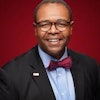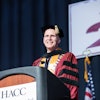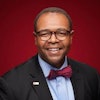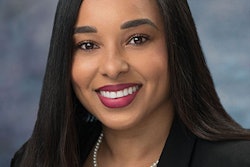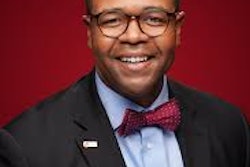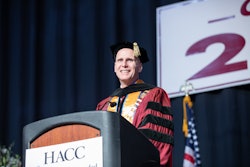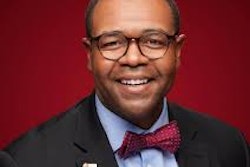The prevailing narrative about higher education is that it serves as the most direct pathway to a better life for individuals and families. That’s especially true for community colleges that serve the most diverse student populations in higher education.
But like so many prevailing narratives, this is still a narrative of privilege. As Dr. Anthony Carnevale states in The Merit Myth that the reality is that “higher education essentially preserves intergenerational racial and class inequality.” Too many barriers still exist that lead to inequitable access to different sectors of higher education, selective programs, and higher-earning careers, equity gaps in dual enrollment, and biased placement and entrance exams, to name just a few.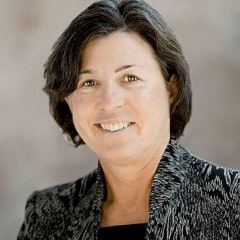 Dr. Karen A. Stout
Dr. Karen A. Stout
Across the nation, community colleges are putting equity at the center of their institutional reform efforts. They have made addressing out-of-school factors such as housing and food insecurity essential parts of the student success agenda. Many are now thinking more deeply about the student populations they have failed to reach and whether the programs they offer meet the education and training needs of all of their communities. We know that college access is more than something we do to bring students to our campuses and that it is a perspective that must also extend into our classrooms.
bell hooks once called education “the practice of freedom,” and teaching and learning is the area which may play the greatest role in dismantling the structures that sustain inequalities on our campuses and in our wider communities by enabling what Hooks calls “a movement against and beyond boundaries.”
Moving Beyond Boundaries
Achieving the Dream, the organization I lead, works from the belief that teaching can either magnify the inequities in our system or be the tool that breaks through and transcends the boundaries that Hooks highlights.
Fostering deeper work around equity in teaching and learning is our number one priority in response to the glaring inequities and racial injustice following the deaths of George Floyd, Ahmaud Arbery, Breonna Taylor, and too many others. We have helped focus our colleges on developing concrete and culturally affirming strategies to dismantle the institutional and pedagogical practices that perpetuate inequities in student outcomes.
At the heart of this work is understanding our students more deeply and building stronger relationships with them. A wealth of research demonstrates that pedagogies that focus on active learning improve student success and help address longstanding equity gaps. Dr. Peter Felten’s research on “relationship-rich” experiences suggests that strong student-faculty, student-staff, and student-student relationships are correlated with a wide range of positive outcomes—and that these correlations are even more notable with racially minoritized and first-generation students.
For our faculty members, making that shift involves challenging entrenched narratives about their roles. Dr. Laura Rendón, in studying what works with first-generation students, calls for the use of a “sentipensate”—or sensing/thinking pedagogy that is culturally validating and affirms student cultures, identities, and experiences. This pedagogical approach is holistic, addressing intellectual, social, emotional, and inner-life skill development. It connects pedagogy to equity and justice by fostering critical analysis, reflective processes, and critical consciousness. And it leverages student assets, including their desire to give back, their ability to see more than one or two common solutions, and their curiosity and resistance.
Making these pedagogies part of ongoing practice requires faculty to understand the lives students live, to listen better, and to learn how our own biases and incorrect assumptions influence our pedagogies and interactions with students. For faculty members to have the space and support in which to do this work, institutions need to understand and support their needs in better ways.
Start With Faculty
The shift to remote learning has helped us to see the challenges our students—and faculty—face in new ways. Without getting to know our faculty as individuals with diverse circumstances, skills, and needs it’s difficult to identify and provide the supports they need to better serve our students. Moreover, many have faced the same deep vulnerabilities as our students over the past year.
During the pandemic, hundreds of faculty members attending our teaching and learning webinars shared their struggles in making the transition to new learning modalities and their frustration with the general lack of institutional support, investment, and empathy required to help them to help students make this transition. As we collectively face the impact of the pandemic and our nation’s long-delayed reckoning with racial justice, we must address the exhaustion they are facing, along with the broader inequities that have always existed among our faculty and staff. As Dr. Bettina Love, the author of Abolitionist Teaching and the Pursuit of Educational Freedom said during one of our events, “if education is going to deal with trauma, we must recognize the trauma of our teachers.”
Advancing Equity Through Democracy
Even as we re-envision our perception of teaching and learning as a powerful lever to dismantle the structures that have contributed to inequities, we also must give new thought to strengthening some of our structures.
After the events of January 6, I’ve found myself questioning whether we are doing enough to build critical and analytical thinking, civics, and information literacy skills and knowledge. Their absence can justifiably be seen as another inequity that contributes to our multi-tiered higher education system, helping perpetuate implicit biases about who is entitled to engage in our civic structures. Our pedagogical focus also must extend to helping sustain democracy in our communities in addition to supporting their labor markets.
Of course, addressing teaching and learning through an equity lens requires an amount of vulnerability. We need to be able to acknowledge to ourselves and to trusted colleagues that we have room to develop, to grow, to change.
The stakes are high. Our sector is often collectively referred to as “Democracy’s Colleges.” We will live up to that lofty name when our teaching and learning helps dismantle inequitable access to higher education and fully supports the equal participation of all citizens in all areas of our communities and the country as a whole.
Dr. Karen A. Stout is president and CEO of Achieving the Dream.


